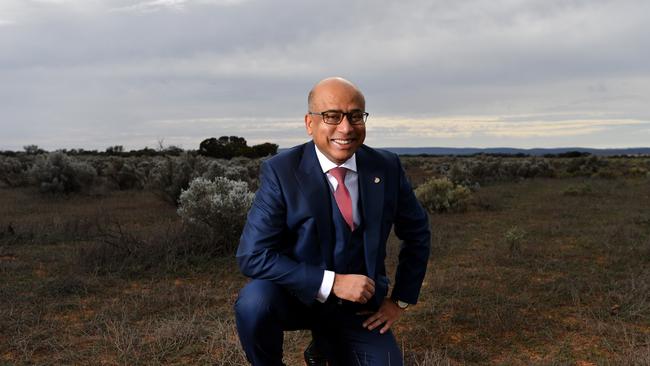Gupta magic in doubt as finances fray
Beneath Sanjeev Gupta’s meteoric growth lies a fragile and interdependent ecosystem.

With stunning views across Scotland’s Lynn of Lorn, the Isle of Eriska hotel was the perfect location for Sanjeev Gupta to celebrate the deal of a lifetime. Businessmen and politicians gathered at the remote five-star hotel on the west coast of Scotland in December 2016 to toast Gupta’s £330 million ($591m) purchase of a clutch of assets from Rio Tinto.
In a stroke he had become one of Britain’s biggest private landowners, buying the nearby Lochaber aluminium smelter, two hydro-electric dams and more than 100,000 acres on the slopes of Ben Nevis.
The Indian-born entrepreneur was joined by his wife, Nicola, lieutenants including Jay Hambro of the Hambro banking dynasty, and two of Scotland’s most senior politicians: Deputy First Minister John Swinney and Fergus Ewing, Cabinet Secretary for the Rural Economy.
The members of the Scottish parliament were there to hail the rebirth of industry in this corner of the Highlands. Gupta would, he promised, save 170 jobs at the smelter and create 2000 more at a new aluminium wheel factory. Due to open in 2020, the factory exemplified Gupta’s vision for a new type of manufacturing: “Greensteel”, a way of reviving tired industries by knitting renewable power with metal production.
Two people who arguably should have been at the dinner were missing: Lex Greensill, the banker behind the eponymous finance company, and Tim Haywood, a star fund manager at the Swiss asset manager GAM. The pair had played instrumental roles in the deal, which had been funded by converting government subsidies into about £360m of bonds — but there was no mention of them.
Greensill and GAM have fuelled Gupta’s ongoing dealmaking through complex financial engineering, turning him from an obscure commodities trader into a global industrialist with an empire stretching from Australia to south Wales, from France to America. The Lochaber deal has long since been eclipsed.
This month’s purchase of seven steelworks across Europe from Arcelor Mittal propelled Gupta to become one of the world’s biggest steelmakers. The Gupta Family Group (GFG) Alliance, the umbrella organisation for his Liberty House, Liberty Steel and Simec companies, now has 30,000 staff and spans 30 countries. Gupta is already eyeing his next target, British Steel, the insolvent owner of the Scunthorpe steelworks.
Yet beneath his meteoric growth lies a fragile and interdependent ecosystem: politicians desperate to save jobs in tired industries, companies keen to shed problematic assets, financiers eager to package and sell government subsidies, and investors hunting for yield in the ultra-low rates environment. “It’s playing roulette with public funds,” said an adviser.
Cracks emerged last summer when GAM revealed that Haywood, head of its £8.5 billion absolute return bond funds, had been suspended. GAM’s share price collapsed, investors rushed to pull cash from the funds, Haywood was sacked, GAM’s chief executive quit and there have been calls for London’s financial watchdog to investigate.
The Lochaber deal, which predated that unravelling, was the perfect chance for Alexander “Lex” Greensill to demonstrate his financial wizardry. A banker from a farming family in Queensland, Greensill is an expert in turning IOUs into tradeable financial instruments. After working in supply chain finance in Sydney, Greensill moved to London, working at Morgan Stanley and Citigroup.
In 2011, he set up his own supply chain finance firm, Greensill Capital, in Bundaberg on the Queensland coast. The business looks to cash in on the imbalance between big companies and their suppliers. In return for a fee, suppliers are paid promptly by Greensill, rather than having to wait for months.
Greensill has become a player in Britain. David Cameron appointed him a senior adviser to the government, and two years ago, he was awarded a CBE for services to the economy. Last year, Cameron was reported to be advising Greensill. In May, Greensill revealed that Japan’s SoftBank had taken a $US800m ($1.15bn) stake, valuing it at $US3.5bn.
Greensill has said he met Gupta in 2013 when he was invited to visit a steel mill in Newport, South Wales, that Gupta had just bought. By the time of the Lochaber deal, Gupta had already forged links with the Scottish government. It lent him £7m to buy the struggling Dalzell and Clydebridge steelworks from Tata in 2015.
Greensill and Gupta devised a plan to persuade the Scottish government to guarantee the smelter’s power purchases from the Lochaber hydro plant for the next 25 years. That provided Greensill with a bulletproof stream of cash, backed by taxpayers, that could be packaged up and sold on as securities.
Greensill converted the power purchase agreement into about £360m of bonds, which, once inflation is included over their 25-year lifespan, have a full value of about £575m. About half the debt was bought by Haywood at GAM, the rest by M&G, Prudential’s fund management division. In 2017, Moody’s gave those bonds a top-notch credit rating — putting them on a par with UK government gilts. Greensill raised a further £260m of bonds from the second hydro plant, Kinlochleven, with GAM again buying the debt.
Haywood’s decision to snap up such huge chunks of illiquid debt raised eyebrows at GAM. Greensill has a close relationship with David Solo, the former head of GAM, who stepped down in 2014. Solo now sits on Greensill’s advisory board. However, it was Gupta and Greensill’s next plan — running diesel generators on used cooking oil — that led to crisis at the Swiss funds giant.
In late 2016, Gupta’s team began scouring the market for used diesel generators. His plan was to take advantage of subsidies for generating power from renewable sources, such as used cooking oil. It was a race against time: the scheme closed to new entrants on March 31, 2017, but anyone who got their generators accredited by then would be guaranteed subsidies called renewables obligation certificates (ROCs) for 20 years.
Gupta turned to firms such as Power Electrics, a family-owned supplier of diesel generators based in Bristol, which helped to supply generators with a total output of 97MW, according to a GFG document. GFG spent about £26m buying the gear.
Gupta had a far more ambitious plan, however. Project LRB, named after the “little red boxes” or shipping containers that housed the generators, intended to raise hundreds of millions of pounds against them. An internal spreadsheet seen by The Sunday Times calculated that running the generators about 80 per cent of the time until 2037 would generate more than £500m of cash — worth about £1bn with inflation factored in. With the state underpinning, Greensill could parcel up and sell those subsidies to GAM. There was another reason for his haste. Gupta was trying to gatecrash a deal to buy the huge, insolvent Arrium steelworks in Whyalla, South Australia, and needed $700m fast.
He turned to Haywood, who duly obliged. In August 2017, GAM bought about £600m of bonds from Gupta, backed by the biodiesel generation, and on August 31, Gupta completed the purchase of Whyalla, saving 6000 jobs and pledging to invest $US1bn in the mining and steelworks business. Morgan Stanley was involved in selling both the Scottish and biodiesel bonds, as placement agent.
The scale of the biofuel deal sent shockwaves through GAM. Haywood’s colleagues were already concerned about his close relationship with Greensill and his use of the financier’s planes. On one occasion, Haywood and his wife flew on a Greensill plane to a charity event.
Haywood’s funds were stuffed with Greensill-related bonds, which at one point made up about 12 per cent of their total assets. His colleague, Daniel Sheard, raised concerns with the company and the Financial Conduct Authority. In February, Haywood was sacked for gross misconduct, including due diligence failings. He is contesting his dismissal.
There were huge holes in GFG’s biodiesel plan. It still does not have the fuel to power the generators profitably. It needs about 180 million litres a year, but a five-year supply deal collapsed in acrimony soon after the bonds were sold to GAM. Nor can it benefit from road fuel subsidies, as had initially been hoped. Ofgem accreditation was granted only in 2018.
The plan is also highly technically challenging. Used cooking oil has a tendency to clog up generators, making around-the-clock generation fiendishly difficult. Emissions must also be filtered.
Today, the generators sit unused at Gupta’s sites across the UK. Ofgem data shows it has barely paid out any ROCs on the generators. GFG is desperately trying to find customers, such as airports, to sign long-term power deals. Every hour that passes eats into the generators’ £600m earning potential.
GFG said: “The business case for the bioliquid generator bonds was robust, independently validated, supported by a third-party fuel offer and shared fully with investors when issued.”
Greensill said it was GAM’s responsibility to do due diligence on the deal. “Greensill has a positive and ongoing relationship with GAM, and all the bonds they have invested in have performed in line with expectations.” GAM has demanded repayment of the bonds, giving Gupta until July 15 to raise about £600m, placing a huge strain on his finances.
He has already bought back the Kinlochleven bonds, and last week paid Arcelor €740m ($1.2bn) for the European steelworks. The deal was policed by the European Commission, which banned Arcelor from providing vendor finance to Gupta and insisted he put in more of his own money. Then there are his many promises to pump cash into factories around the globe, such as Lochaber.
Whether the investment materialises will depend on Gupta’s ability to keep up his alchemy. With GAM’s door firmly shut, his powers may begin to wane.
The Sunday Times


